英语时态之一般过去时的用法讲解
高中英语十六种时态用法详解之一般过去时

play — played,offer — offered,weigh —
的那段记忆以后,捧腹大笑:“你怎么这么搞笑哦,这么花痴哦。”只有
weighed,destroy
—
destroyed,sign
—
signed.(2)在以字母 e 结尾的动词后,只加-d。 如:like—liked,provide—provided,hate— hated,date—dated。(3)在以“辅音字母+y”结 尾的动词后,则改 y 为 i,再加—ed。如: supply — supplied,fly — flied,study — studied.(4) 在以单短元音的重读闭音节结尾且,末尾只有一
。
常
与
过
去
时
间
yesterday,thismorning,justnow,amomentago, inMay,lastnight/year/week,onceuponatime,t heotherday,before „ ,when clause,inthepast 连 用 。 如 – :
Whatdidyoudoyesterday? 昨 天 你 干 了 什 么 ? ImetLinTaothismorning.今天上午我会到了林 涛。Iwasthereamomentago.刚才我在那儿。2.一
—
时,后接不定式的完成时;或它们的过去完成时
Hale Waihona Puke 接不定式的一般式,都可表示过去未曾实现的意 图 、 打 算 或 希 望 。 如 :
Ihopedtohavebeeninvitedtohisweddingparty.
的那段记忆以后 — I hadhopedtobeinvitedtohisweddingceremony. 我本希望他来邀请我参加他的婚礼。
【英语】英语一般过去时用法详解
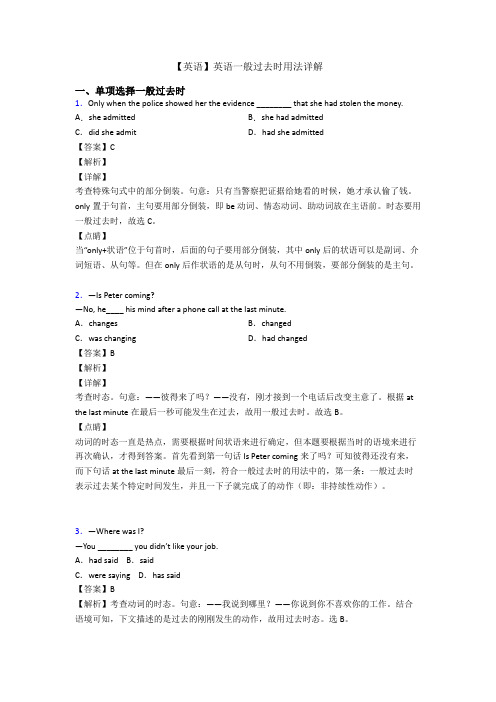
动词的时态一直是热点,需要根据时间状语来进行确定,但本题要根据当时的语境来进行再次确认,才得到答案。首先看到第一句话Is Peter coming来了吗?可知彼得还没有来,而下句话at the last minute最后一刻,符合一般过去时的用法中的,第一条:一般过去时表示过去某个特定时间发生,并且一下子就完成了的动作(即:非持续性动作)。
A.stayedB.stayC.had stayedD.am staying
【答案】A
【解析】
试题分析:and连接并列谓语。And之前是一般过去时。所以and之后也要用一般过去时来保持时态的一致,故用动词的过去式,所以选A。句意:上文,好久没见到你了!你去哪里了?下文,我去了宁夏,并且在那里待了一年,作为一名志愿者在那里教书。
【答案】D
【解析】
【详解】
考查时态。句意:—你去过巴黎薰衣草的故乡普罗旺斯吗?—是的,只有一次。我在那里呆了一个星期。此处是指过去发生的一件事,与现在无关,所以用一般过去时态,故答案为D。
8.—Haven’t seen you for ages! Where have you been?
—I went to Ningxia and ________ there for one year, teaching as a volunteer.
—But sheshe would!
A.has promised B.promised
C.will promise D.promises
【答案】B
【解析】考查动词的时态。——玛丽今晚不参加聚会。——但是她许诺她将会来。根据上文Mary will not attend the party tonight.可知,“promise”这一动作发生在过去,主语she与promise是主动关系。故选B。
英语一般过去时用法详解

英语一般过去时用法详解一、单项选择一般过去时1.—How long have you been going to work on foot?—Since last month when I ________ from a heart attack.A.recovered B.have recoveredC.was recovering D.would recover【答案】A【解析】【详解】考查时态。
句意:——你步行上班已经多长时间了?——自上个月我心脏病康复开始。
last month是过去的的时间点,应该与过去时连用,when引导定语从句,指代last month,指上个月我从心脏病康复。
用一般过去时。
故选A。
2.—Mary will not attend the party tonight.—But she she would!A.has promised B.promisedC.will promise D.promises【答案】B【解析】考查动词的时态。
——玛丽今晚不参加聚会。
——但是她许诺她将会来。
根据上文Mary will not attend the party tonight.可知,“promise”这一动作发生在过去,主语she与promise是主动关系。
故选B。
3.––You seem to be familiar with this city.—I ______ here for three years. It’s so great to be back.A.lived B.had livedC.have lived D.live【答案】A【解析】考查动词时态。
句意:——你似乎对这个城市很熟悉。
——我在这里住过三年,回来真是太好了。
表示以前在这里住过三年,说明一种过去的事实情况,故用一般过去时,故选A4. I wonder what makes him a good English teacher.He ________ as a volunteer in the UK for two years, which helps him with his work a lot. A.has served B.serves C.had served D.served【答案】D【解析】【详解】考查时态。
英语时态:一般过去时
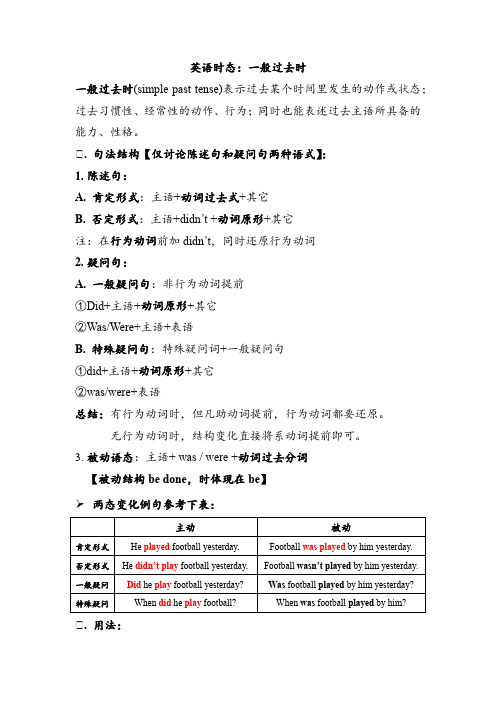
英语时态:一般过去时一般过去时(simple past tense)表示过去某个时间里发生的动作或状态;过去习惯性、经常性的动作、行为;同时也能表述过去主语所具备的能力、性格。
Ⅰ. 句法结构【仅讨论陈述句和疑问句两种语式】:1.陈述句:A. 肯定形式:主语+动词过去式+其它B. 否定形式:主语+didn’t +动词原形+其它注:在行为动词前加didn’t,同时还原行为动词2.疑问句:A. 一般疑问句:非行为动词提前①Did+主语+动词原形+其它②Was/Were+主语+表语B. 特殊疑问句:特殊疑问词+一般疑问句①did+主语+动词原形+其它②was/were+表语总结:有行为动词时,但凡助动词提前,行为动词都要还原。
无行为动词时,结构变化直接将系动词提前即可。
3.被动语态:主语+ was / were +动词过去分词【被动结构be done,时体现在be】➢两态变化例句参考下表:Ⅰ. 用法:1.一般过去时表示在过去某个特定时间发生,也可以表示过去习惯性、经常性的动作。
(一般不强调动作的影响,只说明的事情。
)I talked with Catherine yesterday morning.His mother cooked him breakfast.2.一般过去时常与表示过去的时间状语或从句连用,如:yesterday, last week, in the past, in 1993, at that time, once, during the war, before, a few days ago, when 等。
3.表示过去连续发生的动作时,要用过去时。
这种情况下,往往没有表示过去的时间状语,而通过上下文来表示。
The boy cried for a while,and then drank a cup of tea.4.表示在此之前一段时间内经常或反复的动作。
常与always,never 等连用。
2025届高考英语语法复习一般过去时知识讲解讲义
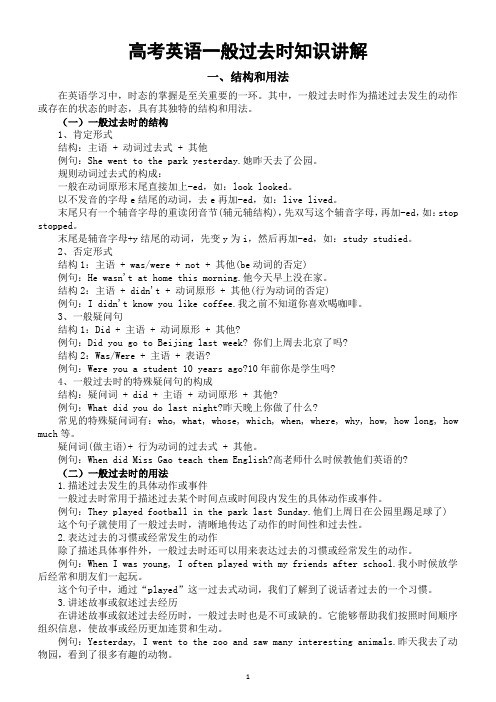
高考英语一般过去时知识讲解一、结构和用法在英语学习中,时态的掌握是至关重要的一环。
其中,一般过去时作为描述过去发生的动作或存在的状态的时态,具有其独特的结构和用法。
(一)一般过去时的结构1、肯定形式结构:主语 + 动词过去式 + 其他例句:She went to the park yesterday.她昨天去了公园。
规则动词过去式的构成:一般在动词原形末尾直接加上-ed,如:look looked。
以不发音的字母e结尾的动词,去e再加-ed,如:live lived。
末尾只有一个辅音字母的重读闭音节(辅元辅结构),先双写这个辅音字母,再加-ed,如:stop stopped。
末尾是辅音字母+y结尾的动词,先变y为i,然后再加-ed,如:study studied。
2、否定形式结构1:主语 + was/were + not + 其他(be动词的否定)例句:He wasn't at home this morning.他今天早上没在家。
结构2:主语 + didn't + 动词原形 + 其他(行为动词的否定)例句:I didn't know you like coffee.我之前不知道你喜欢喝咖啡。
3、一般疑问句结构1:Did + 主语 + 动词原形 + 其他?例句:Did you go to Beijing last week? 你们上周去北京了吗?结构2:Was/Were + 主语 + 表语?例句:Were you a student 10 years ago?10年前你是学生吗?4、一般过去时的特殊疑问句的构成结构:疑问词 + did + 主语 + 动词原形 + 其他?例句:What did you do last night?昨天晚上你做了什么?常见的特殊疑问词有:who, what, whose, which, when, where, why, how, how long, how much等。
英语八大时态详细讲解
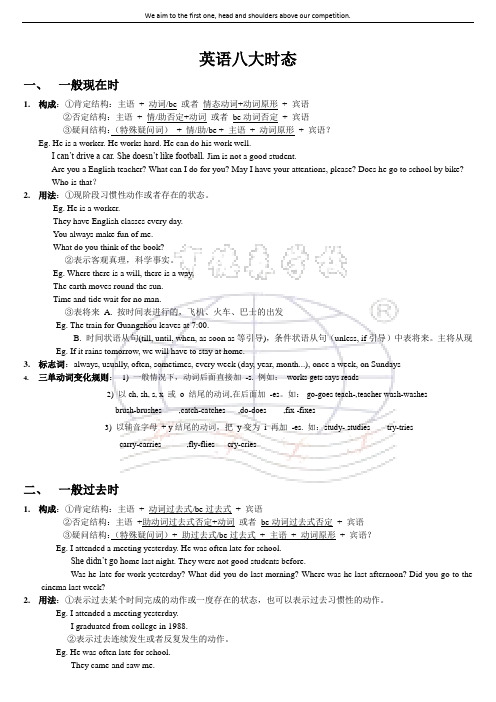
5.不规则变化
六、过去进行时
1.构成:①肯定结构:主语+was/were + doing+ (宾语)
②否定结构:主语+was/were not + doing+ (宾语)
④不能用于进行时的动词:A.表示感觉的(feel, smell, sound, taste)
Eg. The plan sounds good.
B.表示感情、拥有关系、状态或思想的动词:agree, believe, belong, contain, hate, hear, like, love, mind, possess, seem, understand, want等
Eg. I wasgoingto leave when it began to rain.
He looked as if he was about to burst into tears.
③was/were to do和was/were doing:
Eg. I was seeing off my sister at the station the next day.
4)重读闭音节,双写词尾辅音字母加ed.如: preferred(重读在fer前); admittedstopped
三、一般将来时
1.结构:①肯定结构:主语+be going to + do或者will/shall + do+宾语
②否定结构:主语+be not going to + do或者will/shall not + do+宾语
He is not going to play basketball this weekend.
小学英语语法时态一般过去时详解
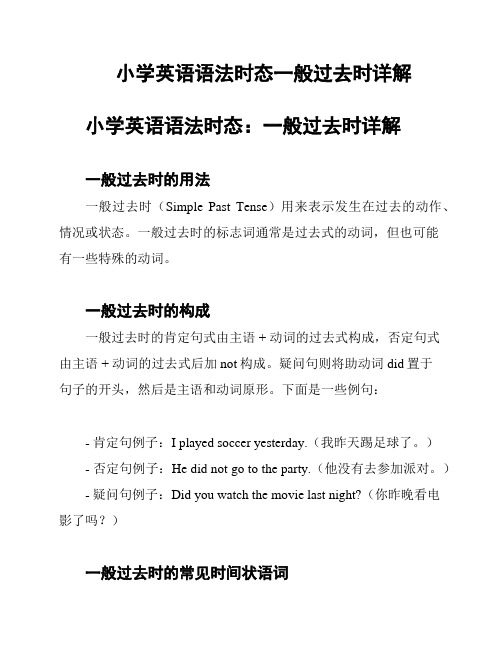
小学英语语法时态一般过去时详解小学英语语法时态:一般过去时详解一般过去时的用法一般过去时(Simple Past Tense)用来表示发生在过去的动作、情况或状态。
一般过去时的标志词通常是过去式的动词,但也可能有一些特殊的动词。
一般过去时的构成一般过去时的肯定句式由主语 + 动词的过去式构成,否定句式由主语 + 动词的过去式后加not构成。
疑问句则将助动词did置于句子的开头,然后是主语和动词原形。
下面是一些例句:- 肯定句例子:I played soccer yesterday.(我昨天踢足球了。
)- 否定句例子:He did not go to the party.(他没有去参加派对。
)- 疑问句例子:Did you watch the movie last night?(你昨晚看电影了吗?)一般过去时的常见时间状语词一般过去时通常会和一些时间状语词一起使用,以明确动作发生的具体时间。
以下是一些常见的时间状语词:- yesterday(昨天)- last week(上周)- two days ago(两天前)- in 1998(在1998年)一般过去时的特殊用法一般过去时有一些特殊的用法需要注意:1. 表示过去经常性的动作或惯。
例如:When I was young, I played soccer every day.(当我年轻时,我每天都踢足球。
)2. 表示过去事实或真理。
例如:The earth revolved around the sun.(地球绕太阳转。
)总结一般过去时用来描述发生在过去的动作、情况或状态。
它的构成简单,使用过去式的动词作为标志词。
通过加入时间状语词,可以更明确地指出动作发生的具体时间。
同时,一般过去时还有一些特殊的用法,需要灵活运用。
>注意:本文内容仅供参考,具体使用时请根据实际情况和教材要求进行调整。
英语时态:一般过去时

英语时态:一般过去时一、定义一般过去时可表示过去某个时间里发生的动作、事情或存在的状态;也可表示过去习惯性、经常性的动作、行为;或表示过去主语所具备的能力、性格。
一般过去时动作发生的时间是“过去”,动作的状态是“一般”。
(注:“一般”态表示的是“动作经常发生或频繁发生”。
)二、时间状语一般过去时常和表示过去某一时间的状语连用,主要包括:yesterday,yesterday morning/afternoon/evening昨天,昨天早上/下午/晚上last night/week/month/year昨晚/上周/上个月/去年the night/week/month/year before last前天夜里/上上个星期/上上个月/前年two minutes/hours/days/weeks/months/years ago两分钟/小时/天/周/月/年前one morning/afternoon/evening在某一早上/下午/晚上that morning/afternoon/evening/day/week/month/summer/year那个早上/那个下午/那个晚上/那天/那周/那个月/那个夏天/那一年just now,at that time,in1990...刚才,当时/在那时,在1990年...三、动词形式一般过去时的动词需用过去式。
动词过去式的构成规则主要包括以下几种:(1)规则动词,在动词原形后直接加ed。
发音规则:在以浊辅音或元音结尾的词后发音/d/,以清辅音结尾的词后发音/t/,以t 或d结尾的词后发音/id/。
示例:ask-asked/t/climb-climbed/d/open-opened/d/pass-passed/t/want-wanted/id/need-needed/id/(2)动词以不发音的e结尾,则只在词尾加d。
发音规则:在以浊辅音或元音结尾的词后发音/d/,以清辅音结尾的词后发音/t/,以t 或d结尾的词后发音/id/。
- 1、下载文档前请自行甄别文档内容的完整性,平台不提供额外的编辑、内容补充、找答案等附加服务。
- 2、"仅部分预览"的文档,不可在线预览部分如存在完整性等问题,可反馈申请退款(可完整预览的文档不适用该条件!)。
- 3、如文档侵犯您的权益,请联系客服反馈,我们会尽快为您处理(人工客服工作时间:9:00-18:30)。
英语时态之一般过去时的用法讲解Company Document number:WUUT-WUUY-WBBGB-BWYTT-1982GT英语时态之一般过去时的用法讲解一、概念一般过去时用来表示过去某一时间内发生的动作或存在的状态以及过去习惯性、反复性的动作。
谓语动词要用动词的过去式,常和表示过去的时间状语连用,如yesterday昨天、last night昨晚、last week上周、last year去年、…ago等二、结构1. Be动词的一般过去时在没有实义动词的句子中使用be动词am is 的过去式为was; are的过去式为were,was是表示单数,were是表示复数肯定句式:主语 + be(was , were) + 其它.否定句式:主语 + be(was , were) + not + 其它.一般疑问句:Be(was , were) + 主语 + 其它2. 实义动词的一般过去时态肯定句要使用动词的过去式,否定句和疑问句要使用助动词did.肯定句式:主语 + 动词(过去式)+ 其它否定句式:主语 + didn’t + 动词(原形)+ 其它【did not = didn’t】一般疑问句:Did + 主语+ 动词(原形)+ 其它【do , does的过去时均为did】注:did和didn’t 是构成一般过去时的助动词,其特点是要在其后跟动词的原形三、规则动词的过去式1.一般情况下,在动词原形后面加-ed:looked played started visited stayed2.以不发音e结尾的动词,在词尾直接加-d: lived cloesd liked loved tasted3.以“辅音字母+ y”结尾的动词,先将 y 改为i ,再加–ed:study→studied try→tried cry→cried copy→copied carry→carried4.以重读闭音节(即辅音+元音+辅音)或r音节结尾,末尾只有一个辅音字母的动词,要先双写这个辅音字母后,再加–ed: stop→stopped plan→planned四、不规则动词的过去式需特殊记忆1. is→was am→was are→were do→did have→had2. begin→began ring→rang run→ran drink→drank sing→sang swim→swamsit→sat give→gave make→made come→came eat→ate3.write →wrote speak→spoke drive→drove choose→chose tell→told ride→rodeshoot→shot get→got win→won forget→forgotshake→shook take→took stand→stood4. go→went meet→met sleep→slept sweep→swept spell→speltfeel→felt keep→kept spend→spent bend→bent5. know→knew fly→flew blow→blew grow→grew throw→threwdraw→drew 特别注意:glow→glowed6. teach→taught catch→caught buy→bought fight→fought think→thought7. find→found hear→heard say→said lie→lay see→saw learn→learnt mean→meant8. put→put read→read cut→cut let→let一般过去时练习题一、单项选择:从下列各题后所给的四个选项中选择最佳答案填空。
(10)( )1. My father______ill yesterday.A. isn't B. aren't C. wasn't D. weren't( )2.______your parents at home last week﹖A. Is B. Was C. Are D. Were( )3. The twins______in Dalian last year. They______here now. A. are; were B. were; are C. was; are D. were; was( )4.______your father at work the day_____yesterday(前天)﹖A. Was; before B. Is; before C. Was; after D. Is; after( )5.—Who was on duty last Friday﹖—______.A. I am B. I was C. Yes, I was D. No, I wasn't二、请用正确动词形式填空。
(10)1. I _________ (have) an exciting party last weekend.2. _________ she _________(practice) her guitar yesterdayNo, she _________.3. What ________ Tom ________ (do) on Saturday eveningHe ________(watch) TV and __________(read) an interesting book.4. They all _________(go) to the mountains yesterday morning.5. She _________(not visit) her aunt last weekend.She ________ (stay) at home and _________(do) some cleaning.三、翻译下列句子(20)1. 我过了一个忙碌但却刺激的周末。
I _________ _________ __________ __________ exciting weekend.2. Jenny喜欢看书。
昨晚她看了一本英语书。
Jenny likes _________ __________.She _________ an English book last night.3. Emma每天都看电视。
可是昨天他没有看。
Emma__________ TV every day.But he _________ ________ ________ yesterday.4. 上周六他们做什么了他们做作业和购物了。
What ________ they _________ _________ SaturdayThey _________ __________ homework and ___________________.5. 今天早上方方得做饭,因为他父亲不在家。
This morning Fangfang ____ ____ ____ ____ because his father _____ _____ ____ yesterday.四、改写句子:(20)1、Lucy did her homework at home.(改否定句)Lucy ________ _______ her homework at home.2、He found some meat in the fridge(冰箱).(变一般疑问句)___________ he __________ ___________ meat in the fridge3、There was some orange in the cup.(变一般疑问句)_______ there _______ orange in the cup4. Frank read an interesting book about history. (一般疑问句)_______ Frank _______ an interesting book about history5. Why not go out for a walk (同义句)_______ ________ ________ out for a walk五、改错题(20)1.How is Jane yesterday _____________________2.He go to school by bus last week.____________________________3.He often goes home at 6:00 last month.____________________________4.I can fly kites seven years ago.______________________________5.Did you saw him just now.____________________________________六、完形填空(10)Tom did not like doing his homework,because he liked to do some1 things after school.And his teacher always2 a lot of mistakes inhis homework.Then one day,his maths teacher 3 at Tom’s homework and saw that he got all his answers right.He was very 4 and surprised(惊奇).The next morning before class,he called Tom 5 his desk and6 to him,“You got all your homework right this time.Did yourfather help you”Sometimes Tom’s father helped him with hishomework,7 this time he didn’t help Tom because he 8 athome.So Tom answered,“NO,Sir.He Was busy last night,soI 9 to do it 10 .”()1.A.others B.another C.the other D.other()2.A.made B.found C.looked at D.looked()3.A.laughed B.knocked C.looked D.saw()4.A.please B.pleased C.pleasure D.sad()5.A.to B.for C.in D.at()6.A.talked B.asked C.spoke D.said()7.A.and B.but C.so D.or()8.A.isn’t B.won’t be C.wasn’t D.can’t be()9.A.wanted B.mustn’t C.liked D.had()10.A.itself B.of them C.myself D.himself七、用所给词的适当形式填空。
